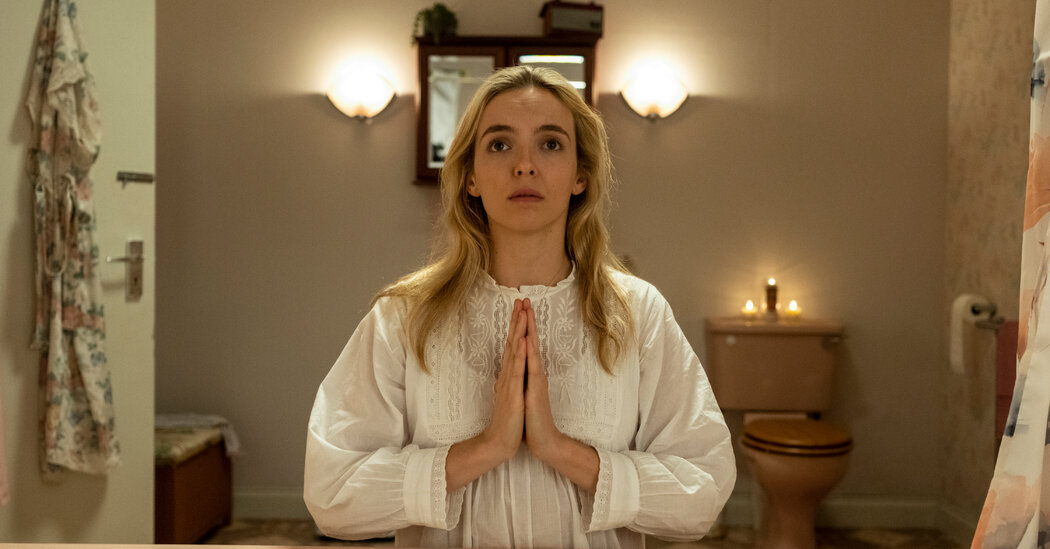In the darkly comic spy thriller’s final season, the wild ride has become a tired jog to the finish line.
It takes some work to make Villanelle, the childishly enthusiastic assassin played by Jodie Comer in “Killing Eve,” less entertaining. But during the show’s homestretch — its fourth and final season premieres Sunday on BBC America — the writers have accomplished it. They’ve given her a conscience, and they won’t let her stop talking about it.
In the show created back in 2018 by Phoebe Waller-Bridge (based on novels by Luke Jennings) subtext was subtext. The mutual attraction of the giddy psychopathic killer Villanelle and the mousy, nervous secret agent Eve (Sandra Oh) didn’t require explanation or extended exploration — it simply needed to percolate while we enjoyed Waller-Bridge’s deranged, morbid, impeccably orchestrated dark-comic spin on the spy thriller.
Waller-Bridge stepped back, though, and since then the show has had a new head writer each season — a system that might have had logistical or public-relations advantages but made little sense from an artistic standpoint. Emerald Fennell kept the high-concept high jinks on track in Season 2, but things slid under Suzanne Heathcote in Season 3. Based on the three episodes made available in advance, the slide continues under Laura Neal in the final season.
It’s impossible to say whether Waller-Bridge could have maintained the relentless pace and the high quality of the macabre jokes. Perhaps it was inevitable — given the currents of the culture, or the finite nature of inventiveness — that Villanelle and Eve would be “opened up” and that the discussion around the series would center on the evolving nature of their relationship rather than on the show’s intricate mechanics and the dynamics of its humor.
But not every character cries out for development; the point of vaudeville is to play an endless series of comic variations on an unchanging, predictable personality. If you think that’s a lesser form of entertainment, tell it to the Marx Brothers.
What we now have in “Killing Eve” is a Villanelle in search of transformation, a tired process that began when she revisited her Russian hometown in Season 3. She has left the assassination business and joined a church, where she applies her screwball energy and guileless vanity to the job of being baptized and expunging her sins.
The repertoire of expressions and mannerisms and the off-kilter rhythm that Comer has developed are as amusing as ever, but the material is lacking — her side of the show has been dulled out, and her performance doesn’t have anywhere to go because the character’s inner life has never been really fleshed out. It didn’t need to be. A conflicted Villanelle is a less interesting Villanelle.
And she’s also, paradoxically, less sympathetic. The joy of the character from the start was the childlike satisfaction she took in being a really good killer; the violence didn’t bother us because the joke worked. Now, when she does kill — out of anger and disappointment rather than a misplaced sense of duty — the bloodshed doesn’t have a comic charge, and it’s simply unsettling.
While Villanelle flounders, Eve is on the rise. She has left MI6 and is working in private security while still chasing the Spectre-like crime consortium known as the Twelve; she is gaining skills and, after the death of her less-than-exciting husband, has taken up with a very fit new boyfriend and investigative partner (Robert Gilbert). Completing the roster of operatives who are at least temporarily out in the cold, Fiona Shaw’s ultracompetent Carolyn has been busted down from MI6 desk head to British cultural attaché in Mallorca. She, too, is obsessed with the Twelve, whom she blames for the death of her son in Season 3, and she takes drastic steps in pursuit of revenge.
It’s all very rational and straightforward (aside from the part where Villanelle starts seeing a doppelgänger of herself as Jesus) and, unfortunately, dull. Comer, Oh and Shaw did a lot of work perfecting the brilliant surfaces of the characters Waller-Bridge created, but the characters are looking washed-out now, and the performances look correspondingly wan.
The framework of “Killing Eve” — Villanelle trying to be good enough for Eve and Eve trying to be cool enough for Villanelle — was sturdy, but building it out has turned into a laborious process. In a recent interview with The New York Times, Comer said of the show, “I feel like it’s sometimes pure escapism.” If only that were still true.


























